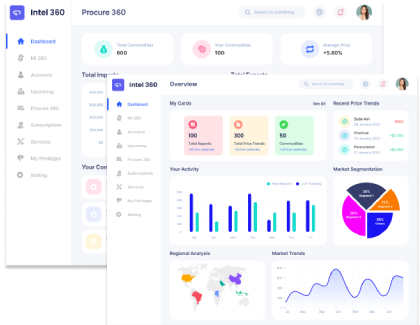Industrial activities have been suspended, international travel has been suspended, and only essential businesses such as food and pharmaceuticals are permitted to operate. Almost all industrial sectors are suffering due to these measures, with factories experiencing supply chain breakdowns and labour shortages.
The chemical industry is no exception. In March 2020, global chemical production fell by nearly 3%. Raw material and labour shortages and government-mandated plant shutdowns are the reasons for this reduction. Since February 2020, the speciality chemicals sector has experienced disruptions and production declines among the various chemical industry categories. The most serious consequences were felt in March, when global speciality chemical production dropped by more than 6%.
Chemical demand is experiencing severe shocks across end markets, global supply chains are disrupted, chemical company stock prices have taken unprecedented hits, and the competitive order of chemical producers in the United States, the Middle East, China, and Europe has virtually changed overnight.
As the world continues to be concerned about health and safety, growth in sales of industrial and institutional cleaners (I&I), disinfectants, and sanitisers are higher than usual. For example, demand for hand sanitisers and disinfectants increased in January 2020 compared to December 2019. As a result, manufacturers of household cleaning supplies and hand sanitisers increased production as demand increased. Many chemical companies were manufacturing these critical products with the intention of donating the majority of them to health-care systems and government agencies. Companies like Dow Chemical donated sanitisers, LyondellBasell donated a key ingredient for sanitisers IPA, Huntsman produced sanitisers for charity purposes, and INEOS which built two new plants to produce sanitisers for free distribution to health authorities.
Specialty chemicals are used in a variety of industries, including polymers and plastics, adhesives, paints and coatings, lubricants, cleaning materials, and many others. Any disruption in this industry has a knock-on effect on a variety of other industries that rely on specialty chemicals. Since the COVID-19 outbreak, there has been an uneven demand for specialty chemicals across various segments. While demand for specialty chemicals has decreased significantly in the paints and coatings industry, it has increased or remained stable in the manufacture of pharmaceuticals, cleaning agents, detergents, flavours and fragrances, and plastics. The paints and coatings business has been seriously impacted by a considerable drop in demand in its two primary end-use sectors, construction and automobile.The pandemic's impact on specialty chemical manufacturers has been mixed. Low crude prices reduced raw material costs for some product lines, while the closure of Chinese plants aided European, American, and Indian manufacturers in filling the void and increasing order intakes.
Chemical companies' stock prices have fallen dramatically since the beginning of 2020, and their future is now dependent on their exposure to COVID-19 and financial strength. Positively affected cash-rich companies may be able to seize opportunities, act countercyclically, and emerge stronger. Companies with disadvantaged portfolios that are financially weak may find themselves in distress and unable to survive in their current size and shape.
On the other side, supply chain disruptions have produced procurement challenges for a number of manufacturers. Companies that depend on Chinese raw materials faced substantial logistical challenges. Speciality chemical makers felt the brunt of the impact in the first quarter of 2021, rather than the fourth quarter of 2020. Clariant and Evonik, two speciality chemical manufacturers, have already reported lower earnings for the first quarter of 2020. These companies are expected to experience a U-shaped recovery, as demand is not expected to increase significantly even after the lockdown in developed economies is lifted. The time and extent of recovery will be determined by how quickly lockdowns are lifted in various parts of the world and how quickly the world recovers from the pandemic.
When it comes to digitalisation, the chemicals industry has been a late adopter compared to many other industries. COVID-19, on the other hand, has begun to demonstrate the power of digital through remote working and plant control system operation. Companies are expecting a surge in the chemicals digitisation agenda, including greater adoption of artificial intelligence (AI), machine learning (ML), robotic process automation (RPA), and other technologies across the front, middle, and back office.
This is a huge opportunity for the chemicals industry to get closer to end-users and accelerate the development of innovative digitally enabled business models that address customer needs. Chemical companies can avoid the commoditisation trap by interacting with customers and pricing on value rather than per tonne.
By using its creativity and resilience to enable ethical value chains, the chemicals sector can build on a long history of increasing the standard of living that is from contributing to safe and affordable food and clean water access, to carbon free energy and transportation. There are also numerous opportunities, such as technological advancements in 3D printing, polymer recycling, green hydrogen as a source of energy, bio-based products, and so on. These are unique opportunities to increase green investments through government stimulus packages while also meeting the United Nations Sustainable Development Goals.
Agrochemicals are expected to dominate the specialty chemicals market, which is being driven primarily by rising population and increased food demand around the world. Micronutrient fertilisers, bio-based fertilisers, and specialty fertilisers (such as liquid fertilisers) are gaining popularity as a result of growing concerns about plant nutrient efficiency and regulatory health and environmental concerns. Along with synthetic herbicides, bio-herbicides that use microbes as biological weed control agents are gaining popularity in integrated pest management techniques. Despite the fact that the segment is a small part of the overall industry, it is expected to grow at a significant rate.
Food consumption is rising as the world's population expands, particularly in China and India. This is expected to drive the agrochemicals market, which will in turn help the specialty polymers market grow over time.
The cosmetic industry is also experiencing strong growth in demand, which is fuelled by increased usage of cosmetic products, which is fuelled by rising demand for anti-aging cosmetic products from the baby boomer and X generation, western culture influence on youth, increased women employment, and continuous product innovation that appeals to the masses. As a result, the region's cosmetic production is increasing, resulting in an increase in demand for cosmetic chemicals.
The rise of the service sector propels the growth of Asia Pacific construction sector forward, resulting in increased demand for office space, residential construction projects, and investments from multinational firms seeking to establish a regional industrial base. Paints and coatings, adhesives and sealants, construction chemicals, and specialty polymers are likely to see increased demand in the future as a result of these factors.




















Share